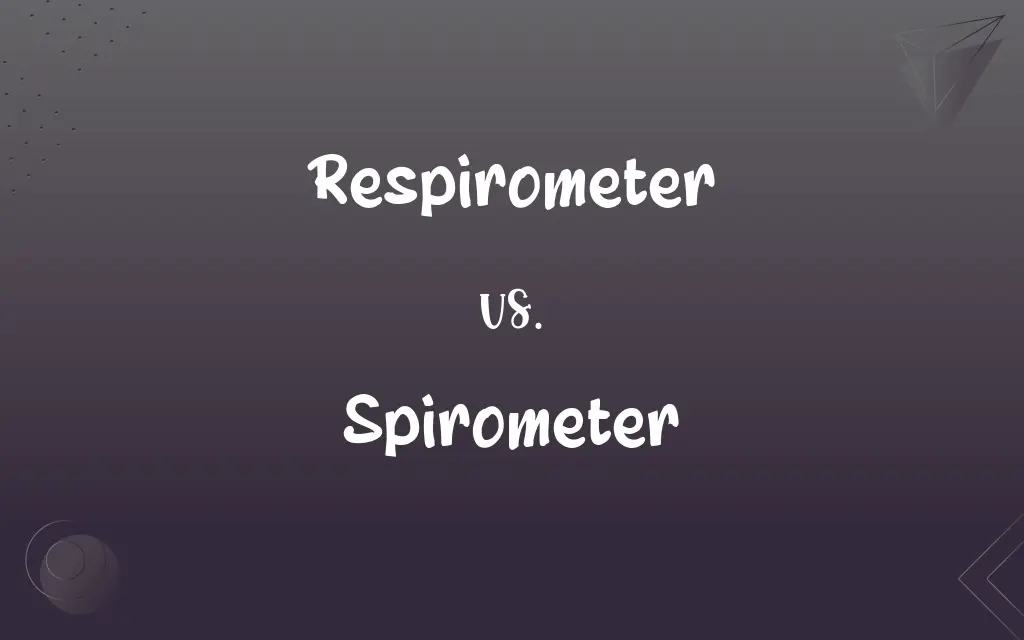Respirometer vs. Spirometer: What's the Difference?
Edited by Aimie Carlson || By Harlon Moss || Updated on November 12, 2023
A respirometer measures the rate of respiration in organisms, while a spirometer measures the lung capacity and air flow in humans.

Key Differences
A respirometer is a device used to measure the rate and volume of respiration in organisms, including plants and small animals, by tracking changes in gas volume or composition. A spirometer, on the other hand, is a medical instrument used to measure the volume of air inhaled and exhaled by the lungs and the speed of the air movement, primarily in humans. Respirometers are used in biological research, whereas spirometers are used in pulmonary function tests.
The respirometer functions by assessing oxygen consumption or carbon dioxide production, providing insights into metabolic rates and respiratory efficiency. Spirometers focus on assessing lung capacity and function, helping diagnose conditions like asthma, chronic obstructive pulmonary disease (COPD), and other respiratory disorders. Thus, respirometers are more about understanding metabolic processes, while spirometers are about evaluating lung health.
Respirometers are often used in laboratory settings for scientific research, environmental studies, and educational purposes to understand respiration dynamics in various organisms. Spirometers are clinical tools, widely used in hospitals, clinics, and even in home health care settings to monitor lung health. This distinction highlights their different application contexts - research versus clinical diagnostics.
In terms of design, respirometers can vary widely, from simple setups measuring gas exchange to more complex systems for detailed metabolic analysis. Spirometers are typically handheld devices with digital interfaces for easy interpretation of lung function. The design of each reflects their specific usage requirements - comprehensive analysis for respirometers and user-friendly interfaces for spirometers.
The data from a respirometer can inform about an organism's health, environmental adaptation, and physiological responses. Spirometer data is crucial for human respiratory health, aiding in the diagnosis, treatment, and monitoring of lung conditions. The information from each device, therefore, serves distinct biological and medical purposes.
ADVERTISEMENT
Comparison Chart
Measurement Focus
Respiration rate in organisms
Lung capacity and air flow in humans
Primary Use
Biological research and environmental studies
Pulmonary function tests and diagnosis
Function
Assesses oxygen consumption and CO2 production
Measures volume and speed of air inhaled/exhaled
Context of Use
Laboratories for scientific research
Clinical settings for health monitoring
Design Variants
Ranges from simple to complex systems
Typically handheld with digital interfaces
ADVERTISEMENT
Respirometer and Spirometer Definitions
Respirometer
A respirometer is a device for measuring the rate of respiration in organisms.
They used a respirometer to study the respiratory response of plants to different temperatures.
Spirometer
A spirometer is an instrument used to measure lung capacity and airflow.
The doctor used a spirometer to assess the patient's lung function.
Respirometer
Helps in understanding physiological responses to environmental changes.
The respirometer data helped analyze how fish adapt to oxygen-poor water.
Spirometer
Often a handheld device with a digital readout for easy use.
The portable spirometer allowed the athlete to monitor lung performance during training.
Respirometer
It assesses metabolic activity by tracking gas exchange.
The respirometer indicated increased metabolic rates under higher oxygen levels.
Spirometer
Used in both clinical settings and personal health monitoring.
Patients with chronic lung conditions regularly use a spirometer for self-monitoring.
Respirometer
Can be used for educational purposes in biology classes.
Students used a simple respirometer in a lab experiment to measure yeast respiration.
Spirometer
It's crucial for diagnosing respiratory conditions like asthma.
A spirometer test confirmed the diagnosis of obstructive lung disease.
Respirometer
Used in biological experiments to measure oxygen consumption.
Researchers employed a respirometer to observe the respiration rates of small mammals.
Spirometer
Measures the volume and speed of inhaled and exhaled air.
The spirometer showed reduced lung capacity, indicating possible COPD.
Respirometer
An instrument for measuring the degree and nature of respiration.
Spirometer
An instrument for measuring the volume of air entering and leaving the lungs.
Respirometer
A device used to measure the rate of respiration of living organisms, such as plants or fish.
Spirometer
(medicine) An instrument for measuring the air capacity of the lungs.
Respirometer
An apparatus for supplying air to a diver under water.
Spirometer
An instrument for measuring the vital capacity of the lungs, or the volume of air which can be expelled from the chest after the deepest possible inspiration. Cf. Pneumatometer.
Spirometer
A measuring instrument for measuring the vital capacity of the lungs
FAQs
Is a respirometer used in medical settings?
It's primarily used in research and educational settings, not typically in clinical medicine.
What is a respirometer used for?
It's used to measure the rate of respiration in organisms.
Can a spirometer diagnose lung diseases?
Yes, it's used to diagnose and monitor conditions like asthma and COPD.
Can I use a spirometer at home?
Yes, portable spirometers are available for home monitoring of lung function.
Is spirometry testing invasive?
No, it's a non-invasive test that involves breathing into the spirometer.
How often should spirometry be done for chronic conditions?
This depends on the condition; some may require daily monitoring, while others may need less frequent testing.
What does a spirometer measure?
A spirometer measures lung capacity and airflow in humans.
Do respirometers measure CO2 levels?
Yes, they can measure CO2 production as part of respiration analysis.
What type of organisms can be tested with a respirometer?
Small animals, plants, and even microorganisms can be tested.
Can respirometers be used for environmental studies?
Yes, they are useful in studying respiration in various environmental conditions.
How does a respirometer work?
It works by assessing the changes in gas volume or composition due to respiration.
Is training required to use a spirometer?
Basic training for correct usage is recommended for accurate results.
What data does a respirometer provide?
It provides data on oxygen consumption and respiration rates.
Are spirometers expensive?
Costs vary, but there are affordable models available for home use.
How accurate are respirometers?
They can be highly accurate, especially in controlled laboratory conditions.
How long does a spirometry test take?
A typical test takes only a few minutes.
Can a respirometer help in understanding metabolic rates?
Yes, by measuring respiration rates, it can provide insights into metabolic activities.
Can anyone use a spirometer?
Most people can use it, but it may be challenging for very young children or those with severe respiratory issues.
Are there different types of spirometers?
Yes, including volume-based, flow-based, and peak flow meters.
Can respirometers be used to study human respiration?
While possible, spirometers are more suited for human respiratory studies.
About Author
Written by
Harlon MossHarlon is a seasoned quality moderator and accomplished content writer for Difference Wiki. An alumnus of the prestigious University of California, he earned his degree in Computer Science. Leveraging his academic background, Harlon brings a meticulous and informed perspective to his work, ensuring content accuracy and excellence.
Edited by
Aimie CarlsonAimie Carlson, holding a master's degree in English literature, is a fervent English language enthusiast. She lends her writing talents to Difference Wiki, a prominent website that specializes in comparisons, offering readers insightful analyses that both captivate and inform.
































































